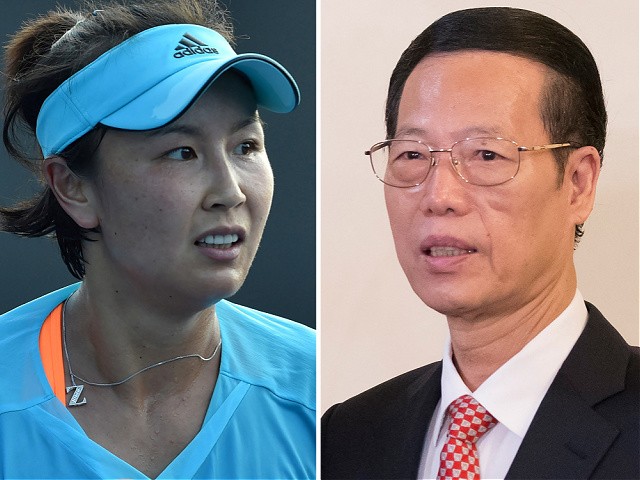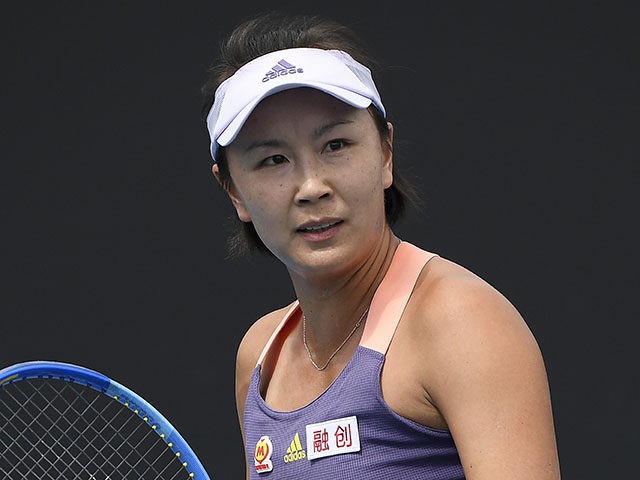The Women’s Tennis Association (WTA) announced on Thursday it would end its boycott of business in China, initially taken to protest the disappearance of Wimbledon champion Peng Shuai, despite the fact that the player has not been seen in public in over a year.
The WTA, the governing body for professional women’s tennis, announced in December 2021 that it would not hold any tournaments in China in protest of Peng’s disappearance. Peng, one of China’s all-time greatest players, went missing in November 2021 after publishing a lengthy post on Weibo, a Chinese regime-controlled social media outlet, accusing top Chinese sports official Zhang Gaoli of raping her. Peng, writing in her post to Zhang, asked him, [Why had you] “brought me to your home and forced me to engage in sexual activities with you?”
Chinese censors rapidly erased the post – but not rapidly enough for users to save and translate it for a global audience – and Peng herself disappeared.

(COMBO) This combination of file photos shows tennis player Peng Shuai of China (L) during her women’s singles first round match at the Australian Open tennis tournament in Melbourne on January 16, 2017, and Chinese Vice Premier Zhang Gaoli (R) during a visit to Russia at the Saint Petersburg International Investment Forum in Saint Petersburg on June 18, 2015 (Photo by Paul Crock and Alexander Zemlianichenko/AFP via Getty Images).
Peng’s post caused an international controversy significant enough to prompt the Global Times, China’s top English-language propaganda outlet, to publish apparently staged photos of Peng in a Beijing restaurant, claiming she was safe and free. The cover-up generated even more outrage and preceded then-Global Times editor-in-chief Hu Xijin’s abrupt decision to retire in December 2021.
Peng finally spoke to international media in February 2022 during the Beijing Winter Olympics, speaking only in Mandarin and accompanied by a Communist Party handler. She told the French magazine L’Equipe that she never disappeared and had never accused Zhang of any crime.
“I would like to know: why such concern? … I never said anyone sexually assaulted me,” the handler translated Peng as saying at the time.
Peng also bizarrely claimed that her lack of communication with the WTA was caused by IT problems on the WTA website.
Peng has not been seen in public since, and reports indicate that searches for her name on Weibo continue to offer no results, a sign of censorship, as of this week.
The WTA has, nonetheless, decided to resume business with China, lamenting that the Communist Party does not appear to have any interest in ever responding to the organization’s demands. Upon announcing its boycott in December 2021, the WTA demanded that China investigate Zhang in response to Peng’s Weibo post and that the country allow a WTA representative to meet with Peng.
“When we moved forward with this decision [the boycott], we were not sure if others would join us,” the WTA said in a statement on Thursday. “We received much praise for our principled stand and believe we sent a powerful message to the world. But praise alone is insufficient to bring about change.”
“After 16 months of suspended tennis competition in China and sustained efforts at achieving our original requests, the situation has shown no sign of changing,” the statement continued. “We have concluded we will never fully secure those goals, and it will be our players and tournaments who ultimately will be paying an extraordinary price for their sacrifices.”
The organization will resume its usual schedule of events in China as of September, it confirmed, proclaiming the boycott a failure.
“We have not been able to achieve everything we set out for, but we have been in touch with people close to Peng and are assured she is living safely with her family in Beijing,” it claimed. “We also have received assurances that WTA players and staff operating in China will be safe and protected while in the country. The WTA takes this commitment seriously and will hold all parties responsible.”
“While we do not regret our decision on the suspension, the WTA and its members feel that now is the time to return to our mission in China,” the WTA concluded. “Peng cannot be forgotten through this process. It is important that our renewed engagement in China provides continued safety for Peng and all the women athletes who will benefit from our return to competition and the opportunities tennis provides.”
Speaking to the Associated Press on Thursday, the chairman of the WTA, Steve Simon, called the boycott “appropriate” but confirmed that it had, in the eyes of the organization, failed.
“But 16 months into this, we’re convinced that our requests will not be met. And to continue with the same strategy doesn’t make sense,” Simon claimed.
According to Sports Illustrated, the most important tournament returning to the WTA schedule is the Shenzhen WTA Finals. The WTA omitted any mention of finances in its statement announcing a return to China, but the magazine noted that it had suffered significant economic losses.
“The tour has struggled financially since leaving China; the season-ending Shenzhen event previously accounted for the greatest source of the WTA’s overall annual revenue, more than $20 million in various fees,” Sports Illustrated reported. “It did not receive the sponsorship and media dollars needed to offset the shortfall of China revenue. It also did not receive a response from China, which, predictably, ignored requests for a full and transparent investigation.”
The magazine added that Simon restored the China tournaments in response to “board and financial pressure,” citing unnamed “sources.”
The WTA boycott of China overlapped with the Chinese government’s Chinese coronavirus “zero-covid” policy, which essentially outlawed mass events such as tennis tournaments. Notably, the WTA boycott ended about five months after the Chinese Communist Party announced that it would “optimize” its “zero-covid” policy – previously requiring city-wide lockdowns and the imprisonment of suspected patients in quarantine camps – to allow greater public engagement, including mass events.
“This year was the first that the WTA would have had to actively boycott tournaments held in China. Instead they have returned at the first opportunity,” the U.K. Guardian noted on Thursday.
The Chinese government has yet to react with any significant statements to the news. In addition to censoring and disappearing Peng, Beijing has largely condemned international concern for the tennis champion and supported Zhang Gaoli, her accused rapist. Zhang was reportedly involved in planning for the Beijing Winter Olympics, and the Communist Party prominently featured him during its Congress in October, offering Zhang a front-row seat.
Outside of the WTA’s coronavirus-era boycott, tennis administrators have largely been supportive of China. The WTA’s male equivalent, the Association of Tennis Professionals (ATP), did not join the WTA in its boycott. While top women’s tennis players shared messages online in support of Peng during the initial days of her disappearance, the top had largely fallen out of the public eye aside from the work of a small number of activists at various tournaments.
At least one tournament – the Championships at Wimbledon, where Peng won a doubles tournament – responded to activists by harassing and assaulting them. Last year, security officers forced activists wearing shirts reading “Where is Peng Shuai?” to face interrogation and only allowed them in to watch games if they promised not to discuss Peng with other spectators. One activist, Australian anti-Chinese Communist Party advocate Drew Pavlou, protested Peng’s disappearance at the men’s singles final match, resulting in a security official shoving him down a flight of stairs. Wimbledon authorities denied that the event occurred despite Pavlou’s assault being broadcast on live television globally.
FLASHBACK — CNN’s Tapper on Peng Shuai: IOC ‘Behaving like a Mob Lawyer,’ Has Blood on Its Hands

Follow Frances Martel on Facebook and Twitter.

COMMENTS
Please let us know if you're having issues with commenting.